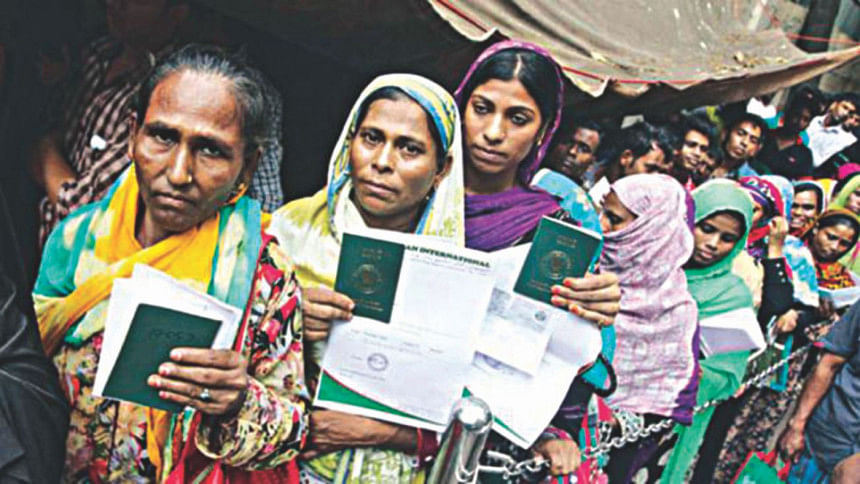Can't they get a better deal?

It may appear as though we are looking for a sledgehammer to crack a walnut, but believe me, it's not as funny as that. It is actually a desperate disease calling for a desperate remedy. And so, you look up to a deliverer of change, however lofty that may be, in a bid to sort out a nagging, mundane problem. For it has human beings at the centre of concern: Sending our women workers to Saudi Arabia for household jobs and their precipitate return home in droves. Pauperised with a polybag of tattered clothes by way of any personal possession, visibly traumatised, with none of their own to receive them on arrival back home, they are infinitely worse off than when they had dared to dream.
The Saudi Crown Prince Mohammed bin Salman is a man of liberating ideas but with his feet on the ground. The Guardian on October 24 last year published an interview with the following analysis: "Central to the reforms [Salman's] has been the breaking of an alliance between hardline clerics who have long defined the national character and the House of Saud, which has run affairs of state."
The changes "have tackled head-on societal taboos such as the recently rescinded ban on women driving, as well as scaling back guardianship laws that restrict women's roles." In the sea change that is about to unfold in KSA, can't the migrant women workers expect a tiny fair deal that will mean so much for them?
Thankfully, Brac is there to receive them at the Shahjalal airport. According to Brac's monitoring, the figures of Bangladeshi women returnees, driven by oppression at their places of work, during the last three years, stood at five thousand.
It is a pity how they would have felt compelled to quit their jobs before the expiry of their contractual periods. After all, contracts were supposed to have been signed between the two countries before the designated one sent specified categories of manpower to the other side. Also, there are different training programmes, including one for imparting basic language skills, for women intending to work in Saudi Arabia. But neither the host government nor the sending government has any contingency plan for the alleviation and rehabilitation of women who might fall victim to violence, fraudulent practices or unceremonious dismissals.
Some returnees have informed that at a jail in Riyadh, 59 women were waiting to return home. They also advised the reporters present at the airport rather caustically that instead of photographing their misery, they should try to persuade the authorities not to send any more women workers to such a gender-insensitive country and secure the safe return of the stranded women.
Naturally, the finger of criticism gets pointed to the Ministry of Expatriates' Welfare & Overseas Employment and the Bangladesh missions abroad. The latter is reportedly handicapped by an inadequate number of economic or business wings that are also poorly manned. Yet, overseas workers trying to approach them on rare occasions have been frustrated in their attempts to receive help. What is more, the wings at the missions are found only to be reactive to any emerging situation rather than being pro-active with dossiers and track records of employees and employers at the ready to troubleshoot at the right time.
The workers' registration with the country's diplomatic missions must be made mandatory by the expatriates' welfare ministry. Our missions abroad must maintain a data bank on the overseas workers and update it on a continuing basis like other foreign missions do with routine regularity.
What's of utmost importance though is that we forge key partnerships with civil societies and pressure groups towards implementation of, and deriving benefits from, the Convention on the Elimination of All Forms of Discrimination Against Women (CEDAW) and the Convention on the Protection of the Rights of All Migrant Workers and their Families (CMWF).
The importance of migrant workers is underlined by the following statement: "Often underpaid and overworked, domestic workers perform services essential for many households to function and to allow others to participate in the formal economy." However, hidden in their private houses, their output remains invisible all the year round, and many governments have yet to accord them full recognition or equal legal protection under labour laws (Slow Reform, ILO; April 27, 2010).
Gaps in labour laws and visa systems give employers enormous control over workers, and "racism against an often dark-skinned 'servant' class has contributed to exploitative working conditions for migrant domestic workers."
NORMLEX, a convention concerning decent work for domestic workers, stipulates: a) they are entitled to keep in their possession travel and identity documents; b) weekly rest should be at least for 24 consecutive hours; c) ensure that fees charged by private agencies are not deducted from the remuneration of the domestic workers; and d) ensure that adequate mechanisms and procedures exist for the investigation of complaints and allegations about fraudulent practices among the activities of private employers…
This is not a problem peculiar to Bangladesh, although our negotiators are often found wanting in bargaining skills. Kenya, Philippines, Uganda, Indonesia, and even Bangladesh have see-sawed between placing a ban and lifting it on sending their women workers to Saudi Arabia or some Middle-East countries for their employers' heavy-handed treatment. Basically, we have to pull up our socks and catch up with some top manpower exporting countries in terms of their best practices and methods of dealing with host countries. We cannot live in complacent glory over money coming anyway regardless of the sweat dripping through it.
Shah Husain Imam is adjunct faculty at East West University, a commentator on current affairs, and former Associate Editor, The Daily Star. Email: [email protected]

 For all latest news, follow The Daily Star's Google News channel.
For all latest news, follow The Daily Star's Google News channel. 



Comments